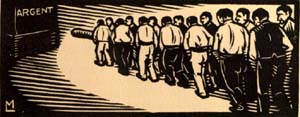


 LISÉE Reclus was for us, one of the best disciples of Bakunin. Reclus developed from 1878 until 1880 onward, through the valuable influence of our great teacher Peter Kropotkin. towards Anarchism-Communism; and in October 1880 we find Reclus at the side of Kropotkin, Carlo Cafiero and others at the Congress of Chaux de Fonds, developing and founding those principles of the economic phase of modern Anarchism, which have remained prevalent until today, and which will advance towards victory, if mankind is to be liberated. Altogether, the year 1880 may have had the greatest importance in the intellectual utility of Peter Kropotkin too, because in this year, living in Clarens together with Elisée Reclus, Kropotkin narrates in his wonderful "Memoirs", that there he was writing under the influence of Elisée Reclus his immortal pamphlet: "An Appeal to the Young". It is not too much to say, that Kropotkin has written this as well as many other things, under the direct inspiration of Elisée Reclus.
LISÉE Reclus was for us, one of the best disciples of Bakunin. Reclus developed from 1878 until 1880 onward, through the valuable influence of our great teacher Peter Kropotkin. towards Anarchism-Communism; and in October 1880 we find Reclus at the side of Kropotkin, Carlo Cafiero and others at the Congress of Chaux de Fonds, developing and founding those principles of the economic phase of modern Anarchism, which have remained prevalent until today, and which will advance towards victory, if mankind is to be liberated. Altogether, the year 1880 may have had the greatest importance in the intellectual utility of Peter Kropotkin too, because in this year, living in Clarens together with Elisée Reclus, Kropotkin narrates in his wonderful "Memoirs", that there he was writing under the influence of Elisée Reclus his immortal pamphlet: "An Appeal to the Young". It is not too much to say, that Kropotkin has written this as well as many other things, under the direct inspiration of Elisée Reclus.![]() He has been in the realm of science one of the greatest; but his great dedication to Geography and Geology is so splendid only because it was always inspired by his love for mankind and all those trodden down by Power and Government.
He has been in the realm of science one of the greatest; but his great dedication to Geography and Geology is so splendid only because it was always inspired by his love for mankind and all those trodden down by Power and Government. ![]()
Whoever knows his writings, his scientific research, will testify to it, that for Elisée Reclus science and knowledge was not an abstract matter to be pondered upon, in the quiet study alone, but a reality, to be applied and utilised for the increase of happiness for all.
For Elisée Reclus the guiding principle of evolution, as he perceived it, was the incessant struggle of mankind towards all those revolutions which will sweep aside ignorance, authority and exploitation. This is the cause, that he, as a scientist, whose standard work, "The Universal Geography", comprising 19 volumes, has still left him the time and the inner longing to devote himself also to writing for the an archistic press, elaborating articles and lectures. In short, he was as a scientist, a propagandist of anarchism, as a propagandist he was an anarchist of science...![]()
I shall never forget with what enthusiasm our dear and be loved John Most, to whom I owe my first introduction in anarchism, has described to me the personality of Elisée Reclus, who visited him in New York, during the eighties of the last century. ![]()
"I was sitting in my poor editorial chair in William Street, where at that time the Freiheit was published. Suddenly someone tapped me on my back, while I was writing. Turning angrily round, I saw before me a small-sized personality of advanced age, but with striking features whose eyes streamed kindness and fraternity."
"Excuse me for disturbing you," he added modestly.
"I must say, I was happy to be thus disturbed. I embraced Elisée Reclus, and the hours which I enjoyed in his company belong to the brightest and happiest in my life. His whole personality is invigorating. His eyes penetrate the universe and give one the feeling that one is, in the struggle for the emancipation of the workers, in unity and harmony with cosmic forces. Elisée Reclus I count as one of the great est inspirers, since I became an anarchist."
For all that Most has felt through him, mankind owes to Elisée Reclus! He has laid on the altar of human knowledge the gains of clear thinking and noble aspiration. To him the anarchist movement owes one of the most brilliant and ennobling features. What he expresses so beautifully in his pamphlet on "The Ideal and Youth", Elisée Reclus has given through his mighty brain and strong stalwart character to our whole international movement: its eternal youthful strength in the conquest of the ideal of liberty!
PIERRE RAMUS
